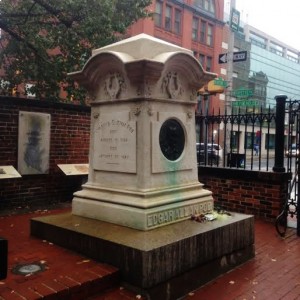Baltimore’s love affair with Edgar Allan Poe (Part Two)
Flowers for Poe (Lauren Molander)
The second of a two-part interview with Poe scholar Richard Kopley
October 7 marks 166 years since the death of beloved Master of Horror, Edgar Allan Poe. In light of the anniversary, the Baltimore Post-Examiner had a chance to chat with accomplished Poe scholar Richard Kopley, PhD., who has dedicated many years to his in-depth study of the author’s life and work.
In Part One of our interview, Kopley spoke about his own relationship with Poe, Poe’s reputation as the “father of the modern detective genre,” and the fascinating potential inspiration behind some of Poe’s mysterious writings.
In Part Two, Kopley explains the role that Baltimore played in Poe’s life, as well as the complex journey that brought him here. He also discusses the mystery surrounding his death (and whether it’s important) and the reasons why we remain so captivated with the writer after all these years, in Baltimore and around the world.
BPE: Poe wasn’t a Baltimore native. He was born in Boston, and lived in several cities as far away as London. What events in his life brought him here?
RK: In Richmond, Poe had a very difficult relationship with his foster father, John Allan. He was a very practical man, and wanted Poe to be the same. Allan encouraged Poe to work at his own business, or perhaps go into law. But, Poe didn’t have any interest in that. He was a difficult fellow. He just wanted to do what he wanted to do, which was to write. He was totally resistant to any sort of guidance or control, and he was not appreciative. After all, Allan had taken him in when he was an orphan, and yet Poe didn’t express any gratitude.

He went to the University of Virginia, and while he was there, took up gambling. He lost $2,000, which was an astounding amount of money for that period. So, John Allan took him out [of school], and that was the end of Poe’s college education. Poe couldn’t stand working for Allan, so he just left and went to Boston [where he would publish the 1827 volume, “Tamerlane”].
Then, he joined the army and went to South Carolina. After his foster mother died in 1829, to please Allan, he decided to go to West Point and become a cadet (though he was a bit old for that). Eventually, Poe decided there was no way truly to satisfy his foster father, and had himself deliberately court-martialed.
Unsurprisingly, after the court-martial Poe and Allan were not on good terms.
Poe needed a home base, and Richmond wasn’t it anymore. But, in Baltimore, he had family. His father’s sister, Maria Clemm, was living there in poverty. It was a pretty bleak life, but she had an apartment, a son and a daughter [his cousin Virginia, whom he would go on to marry]. Also in Baltimore was Poe’s biological brother, Henry, whom he cared a great deal about.
While he lived in Baltimore, Poe turned to fiction. He eventually returned to Richmond, where he found success as editor of the Southern Literary Messenger, but Baltimore was a kind of launching place for him. He wasn’t in the limelight there, he was developing his craft, and he was beginning to develop a network. It was a critical time in his life. Baltimore is one of the places where there’s probably much still to be learned about Poe’s life. We don’t know as much as we would like to.
BPE: Though he no longer lived here, Baltimore is where Poe died- a highly mysterious event that’s spawned much speculation. Do you agree with a particular theory?
RK: That’s one of the things we’ll never know. If we do finally learn, one day, that’d be very exciting. But, up until now, there’s nothing I find convincing about the various recent theories.
The old, sort of tried-and-true interpretation is that he was cooped– a practice of giving a fellow alcohol if he would vote for your man in an election, perhaps repeatedly. We can’t be certain, but it’s plausible that that might’ve happened. There was an election at the time, and he was found near a tavern that was a voting site, but we don’t know. Certainly, [an alcoholic overdose] seems more plausible to me than the myriad alternatives I’ve heard in recent years.
I don’t spend a lot of time in that area, because I don’t believe in the validity in most of the theories.

BPE: Some of the theories are truly odd, like one suggesting that Poe faked his own death and went on to ghost-write as Mark Twain. What’s the most outlandish theory you’ve heard?
RK: I don’t even want to honor the theories by naming them. I don’t think they’re worth thinking about- they’re more a matter of speculation than anything else. And, frankly, it’s Poe’s life– his accomplishments- that are the real reason why we study him, and why he’s so interesting to us.
BPE: “Interesting” may be an understatement, especially in Baltimore. What do you think it is that keeps this city so infatuated with Poe after all these years?
RK: He’s probably your most famous Native Son!
The key fact is that Poe is buried in Baltimore. That gives considerable weight to the city’s interest in him, and it also tends to emphasize the horrific. He was buried in one spot until 1875, when he was exhumed and reburied in a more prominent spot with a large stone. It’s quite nice, and has gotten a lot of attention, not least of all because of the Poe Toaster. There’s also a terrific Poe collection at the Pratt Library, and you’ve got that fabulous statue of him [at the University of Baltimore]. People are fascinated by the connection between Poe and Baltimore, and that fascination just keeps building.
Halloween is a particular climax for Poe. Every time October comes around, he’s got to be around somewhere. If you’re a Poe performer, you’re pretty busy in October.
People like to think of Poe as a kind of friend- a sort of friendly boogeyman.
BPE: Poe’s immense popularity as a writer endures worldwide. What do people love most about him?
RK: Poe’s work is intense, and exciting and accessible. One of the charms of Poe is that you can understand him. Even as a young person, let’s say 10 or 12 or 14, you can get Poe. You can read “The Raven,” or “The Tell Tale Heart” or “The House of the Fall of Usher,” and you can get it! There’s a unique place that Poe has in many of our lives as maybe the first great writer who was accessible to us.We sort of have that affectionate memory of him.
Back in 1999, I was running a conference on Poe in Richmond, and a guy submitted a proposal for a paper called “Poe or The 90s.” I thought it was going to be a paper about Poe for the 1990s, but that wasn’t it. It was Poe for people in their 90’s! These older people came to this elder-hostel teacher and said, “When we were kids, Poe was a very big deal. We read him in the 1920’s, and we wonder what we would think about him now.”
And so, this fellow taught a course on Poe to these folks who wanted to revisit him. I think that’s great! His writing rewards that new attention. He can be read at multiple levels at multiple ages, and we will always find something new.

Poe was also a spectacularly versatile writer, and there’s much still to be learned from his work.
RK: While some writers have a more singular kind of achievement, Poe was very proud of the fact that he was accomplished in many different areas of writing. He’s famously the “horror-meister,” but he also invented the detective story, if your preference isn’t for horror but for logical deduction. And, he wrote great lyric poems, like “Annabel Lee” and “El dorado,” and he worked as well in science-fiction and fantasy. He even created a cosmological treatise, called Eureka. He was also one of the great journalists, and certainly one of the greatest literary critics of his time.
We continue to want to know more about Poe, and we do know more. Over the decades, people figure things out and documents turn up, and it goes on and on. People are still studying the works of the classical period, or The Bible, and Poe wasn’t even 200 years ago. We’re fascinated by him, and we have the reward that we’re still learning more. It doesn’t stop.
BPE: You know Poe, our friendly boogeyman, better than most. If he were alive today, what kinds of media do you think he’d enjoy working with? Would he be as successful as he was during his own era?
RK: If Poe were living in modern times, maybe he’d be writing for television! Maybe he’d be a blogger. I can imagine him in Hollywood, or New York. Maybe he’d be making some serious money, which he never did in his own life.
But, he led an erratic life, so it would’ve likely been a struggle for him even today because of his drinking. Perhaps today, he might have the advantage of some medical help for his situation that wasn’t available when he was alive, and Alcoholics Anonymous [as well]. Maybe they would have helped him, maybe not, but he would’ve had a better chance. Perhaps he could’ve lived a longer life, and published more.
He might’ve been one of these people who just loves literature, and regardless of all of these new media, stuck with that. Writers like Stephen King have had immense success, so if Poe were a writer today, writing the kind of thing he wrote, I’d venture to say Poe would have success, too. After all, we still read him all these years later!
Of course, today he’d be writing about different subjects in much different language. But, with the gift that he had, he would be doing something fabulous, I’m sure.
For more information about Edgar Allan Poe’s connections to Baltimore, visit the Edgar Allan Poe Society of Baltimore.

Lauren Molander, a Baltimore native, is on a long-winded journey to find her place in the world. She majored in Media and Communications Studies at UMBC, and hopes to build a career working with words.
Lauren is unusually enthusiastic about roller coasters, SNL, fancy teas, cosplay culture and the broody music of her early teenage years. In her free time, she can be found playing with makeup, beating the same video games repeatedly, begging her cats for affection, reading books by funny people and binging on anime.
She is still waiting patiently for her (tragically delayed) letter from Hogwarts.

